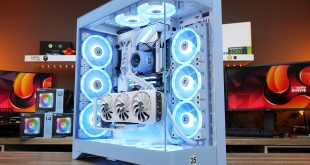V2011 is the first release of 3DStudio Max to fully support the Windows 7 operating system. This is a professional level tool that many people use for work purposes and our test will show any possible differences between board design today.
Autodesk 3ds Max Design 2011 software offers compelling new techniques to help bring designs to life by aggregating data, iterating ideas, and presenting the results.
Streamlined, more intelligent data exchange workflows and innovative new modeling and visualization tools help significantly increase designers’ creativity and productivity, enabling them to better explore, validate, and communicate the stories behind their designs.
Major new features:
- Slate: A node based material editor.
- Quicksilver: Hardware renderer with multithreaded rendering engine that utilizes both CPU and GPU.
- Extended Graphite Modeling Toolset
- 3ds Max Composite: A HDRI-capable compositor based on Autodesk Toxik.
- Viewport Canvas toolset for 3D and 2D texture painting directly in the viewport
- Object Painting: use 3D geometry as ‘brushes’ on other geometry
- Character Animation Toolkit (CAT): now integrated as part of the base package
- Autodesk Material Library: Over 1200 new photometrically accurate shaders
- Additional file format support: includes native support for Sketchup, Inventor
- FBX file linking
- Save to Previous Release (2010)
We created a new 6200×2400 scene and recorded the time for the hardware to finalise the render.
Very strong results from the Kingston HyperX Predator 2,666mhz as the extra bandwidth allows a small performance boost over even the 2,400mhz memory. The 1,600mhz and 1,333mhz memory hampers system results due to limited bandwidth.
 KitGuru KitGuru.net – Tech News | Hardware News | Hardware Reviews | IOS | Mobile | Gaming | Graphics Cards
KitGuru KitGuru.net – Tech News | Hardware News | Hardware Reviews | IOS | Mobile | Gaming | Graphics Cards



